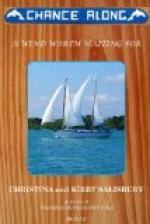To the early Klondikers, Chilkoot Pass was a personality, a Presence at once sinister, cruel, and forbidding. So, too, only in greater measure, was Miles Canon. The Chilkoot toyed with men, it wore them out, it stripped them of their strength and their manhood, it wrecked their courage and it broke their hearts. The canon sucked them in and swallowed them. This canon is nothing more nor less than a rift in a great basaltic barrier which lies athwart the river’s course, the entrance to it being much like the door in a wall. Above it the waters are dammed and into it they pour as into a flume; down it they rage in swiftly increasing fury, for it is steeply pitched, and, although the gorge itself is not long, immediately below it are other turbulent stretches equally treacherous. It seems as if here, within the space of some four miles, Nature had exhausted her ingenuity in inventing terrors to frighten invaders, as if here she had combined every possible peril of river travel. The result of her labors is a series of cataclysms.
Immediately below Miles Canon itself are the Squaw Rapids, where the torrent spills itself over a confusion of boulders, bursting into foam and gyrating in dizzy whirlpools, its surface broken by explosions of spray or pitted by devouring vortices resembling the oily mouths of marine monsters. Below this, in turn, is the White Horse, worst of all. Here the flood somersaults over a tremendous reef, flinging on high a gleaming curtain of spray. These rapids are well named, for the tossing waves resemble nothing more than runaway white horses with streaming manes and tails.
These are by no means all the dangers that confronted the first Yukon stampeders—there are other troublesome waters below—for instance, Rink Rapids, where the river boils and bubbles like a kettle over an open fire, and Five Fingers, so-called by reason of a row of knobby, knuckled pinnacles that reach up like the stiff digits of a drowning hand and split the stream into divergent channels—but those three, Miles Canon, the Squaw, and White Horse, were the worst and together they constituted a menace that tried the courage of the bravest men.
In the canon, where the waters are most narrowly constricted, they heap themselves up into a longitudinal ridge or bore, a comb perhaps four feet higher than the general level. To ride this crest and to avoid the destroying fangs that lie in wait on either side is a feat that calls for nerve and skill and endurance on the part of boatmen. The whole four miles is a place of many voices, a thundering place that numbs the senses and destroys all hearing. Its tumult is heard afar and it covers the entire region like a blanket. The weight of that sound is oppressive.




